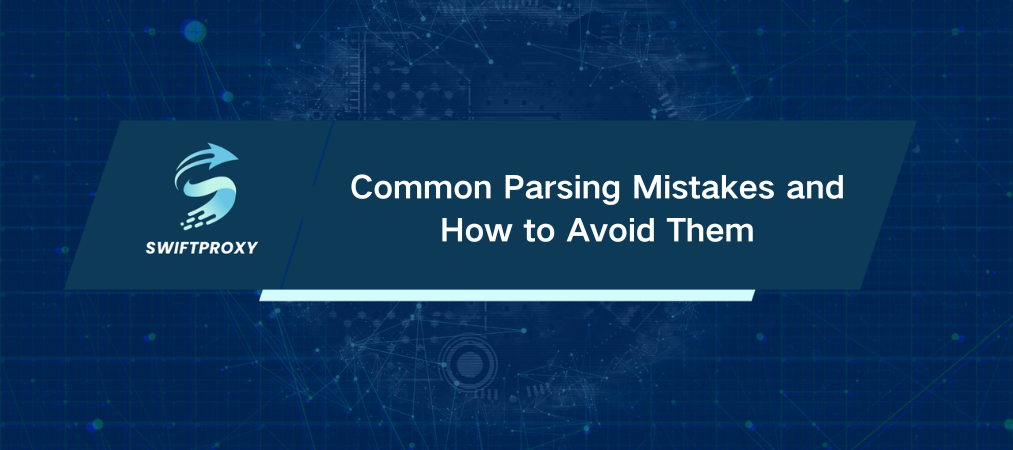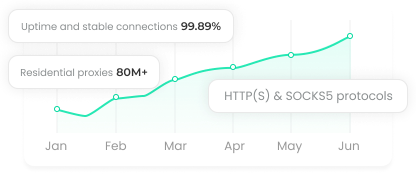Common Parsing Mistakes and How to Avoid Them

Imagine that your parser is running smoothly, collecting crucial competitor prices or market insights. Then, suddenly the site blocks your requests. No data. No warning. Or worse, you're staring down legal trouble because you crossed a line.
Parsing automates data collection. Sounds simple, right? Marketers track prices and trends. Analysts gather data for reports. Developers build databases. But just one slip-up can ruin everything.
Your IP could get blacklisted. Your data might be incomplete or corrupt. You could even face accusations of breaking site rules. Costly mistakes lurk at every step.
Let's cut to the chase. Here are six common parsing mistakes developers make—and exactly what you need to do to dodge them:
1. Ignoring Site Rules
Sites set rules for a reason. You'll find them in the robots.txt file or user agreements. Ignore them, and you risk your IP getting banned or worse—legal action.
What to do:
Check https://example.com/robots.txt before you start. Look for lines like:
User-agent: *
Disallow: /private/
Allow: /public/
Respect those "Disallow" paths. If you really need data from a restricted section, reach out. Many sites offer APIs or data-sharing options if you ask.
Following rules isn't just about playing nice. It's about protecting your project.
2. Using One IP for Everything
Sending all your requests from a single IP is a red flag. Sites monitor request frequency. Hit a threshold, and your IP gets blocked.
Picture that 500 requests a minute from one IP. The site's anti-bot defense kicks in. Your parser's dead in the water, maybe for days.
How to avoid:
Use proxies.
Residential: looks like a real user's IP.
Mobile: hardest to detect, comes from real mobile networks.
Server: budget-friendly, but easier to spot.
Rotate your IP every few requests.
Add pauses—2 to 5 seconds—between queries.
Break your requests into stages, avoid bursts.
A rotating IP strategy combined with pauses mimics real user behavior. Your best defense against bans.
3. Underestimating Captcha
Captcha is the site's gatekeeper. It stops bots dead in their tracks. If your parser hits a captcha, it either freezes or keeps banging useless requests, risking a ban.
The fix:
Integrate captcha-solving services:
2Captcha for text and images.
AntiCaptcha for reCAPTCHA, hCaptcha, and tough captchas.
CapSolver for lightning-fast responses.
Whenever possible, find an API alternative—sites often hide APIs behind dynamic pages.
Reduce captcha triggers by rotating IPs and slowing request rates.
Ignoring captcha? You're playing with fire.
4. Missing Dynamic Data
Modern sites load content via JavaScript—AJAX calls that don't appear in static HTML. Basic parsers like BeautifulSoup miss this entirely.
Result? You get blank pages or placeholders instead of real data.
How to fix:
Use tools that render JavaScript:
Selenium: simulates a real browser.
Puppeteer or Playwright: headless browsers for powerful control.
Hunt down APIs behind the scenes via browser developer tools.
Wait for all elements to load fully before scraping.
Without handling dynamic content properly, your parser's just spinning its wheels.
5. No Data Storage Plan
Collecting tons of data without a storage strategy is a nightmare waiting to happen. Your files get messy. Your queries slow down. Important info disappears.
To avoid disaster:
Choose the right format:
CSV for small, uniform data.
JSON for complex, nested structures.
Databases (PostgreSQL, MongoDB) for large-scale, fast access.
Organize data by date, source, or type.
Use indexes to speed up lookups.
Back up your data regularly.
Secure your storage with encryption and safe protocols.
Good data is useless if you can't find or trust it.
6. Requesting Too Fast
Bombarding a site with rapid-fire requests screams "bot." Sites track timing closely. Hit too hard, and you're banned.
How to stay under the radar:
Add delays between requests—2 to 3 seconds is a good start.
Randomize pauses (1 to 5 seconds) to mimic human browsing.
Adjust intervals based on site responses: slow down if you see errors like 429 or 403.
Use adaptive algorithms that modulate request speed dynamically.
The smoother and more human your request pattern, the longer you stay welcome.
The Bottom line
Parsing is powerful but only when done right. Avoid these six mistakes and you'll save time, money, and headaches. Set clear rules, rotate your IPs, outsmart captchas, handle dynamic content, store data smartly, and pace your requests. By doing this, you're not just scraping data—you're building a sustainable, efficient system that delivers real value.
Note sur l'auteur

Imagine that your parser is running smoothly, collecting crucial competitor prices or market insights. Then, suddenly the site blocks your requests. No data. No warning. Or worse, you're staring down legal trouble because you crossed a line.
Parsing automates data collection. Sounds simple, right? Marketers track prices and trends. Analysts gather data for reports. Developers build databases. But just one slip-up can ruin everything.
Your IP could get blacklisted. Your data might be incomplete or corrupt. You could even face accusations of breaking site rules. Costly mistakes lurk at every step.
Let's cut to the chase. Here are six common parsing mistakes developers make—and exactly what you need to do to dodge them:
1. Ignoring Site Rules
Sites set rules for a reason. You'll find them in the robots.txt file or user agreements. Ignore them, and you risk your IP getting banned or worse—legal action.
What to do:
Check https://example.com/robots.txt before you start. Look for lines like:
User-agent: *
Disallow: /private/
Allow: /public/
Respect those "Disallow" paths. If you really need data from a restricted section, reach out. Many sites offer APIs or data-sharing options if you ask.
Following rules isn't just about playing nice. It's about protecting your project.
2. Using One IP for Everything
Sending all your requests from a single IP is a red flag. Sites monitor request frequency. Hit a threshold, and your IP gets blocked.
Picture that 500 requests a minute from one IP. The site's anti-bot defense kicks in. Your parser's dead in the water, maybe for days.
How to avoid:
Use proxies.
Residential: looks like a real user's IP.
Mobile: hardest to detect, comes from real mobile networks.
Server: budget-friendly, but easier to spot.
Rotate your IP every few requests.
Add pauses—2 to 5 seconds—between queries.
Break your requests into stages, avoid bursts.
A rotating IP strategy combined with pauses mimics real user behavior. Your best defense against bans.
3. Underestimating Captcha
Captcha is the site's gatekeeper. It stops bots dead in their tracks. If your parser hits a captcha, it either freezes or keeps banging useless requests, risking a ban.
The fix:
Integrate captcha-solving services:
2Captcha for text and images.
AntiCaptcha for reCAPTCHA, hCaptcha, and tough captchas.
CapSolver for lightning-fast responses.
Whenever possible, find an API alternative—sites often hide APIs behind dynamic pages.
Reduce captcha triggers by rotating IPs and slowing request rates.
Ignoring captcha? You're playing with fire.
4. Missing Dynamic Data
Modern sites load content via JavaScript—AJAX calls that don't appear in static HTML. Basic parsers like BeautifulSoup miss this entirely.
Result? You get blank pages or placeholders instead of real data.
How to fix:
Use tools that render JavaScript:
Selenium: simulates a real browser.
Puppeteer or Playwright: headless browsers for powerful control.
Hunt down APIs behind the scenes via browser developer tools.
Wait for all elements to load fully before scraping.
Without handling dynamic content properly, your parser's just spinning its wheels.
5. No Data Storage Plan
Collecting tons of data without a storage strategy is a nightmare waiting to happen. Your files get messy. Your queries slow down. Important info disappears.
To avoid disaster:
Choose the right format:
CSV for small, uniform data.
JSON for complex, nested structures.
Databases (PostgreSQL, MongoDB) for large-scale, fast access.
Organize data by date, source, or type.
Use indexes to speed up lookups.
Back up your data regularly.
Secure your storage with encryption and safe protocols.
Good data is useless if you can't find or trust it.
6. Requesting Too Fast
Bombarding a site with rapid-fire requests screams "bot." Sites track timing closely. Hit too hard, and you're banned.
How to stay under the radar:
Add delays between requests—2 to 3 seconds is a good start.
Randomize pauses (1 to 5 seconds) to mimic human browsing.
Adjust intervals based on site responses: slow down if you see errors like 429 or 403.
Use adaptive algorithms that modulate request speed dynamically.
The smoother and more human your request pattern, the longer you stay welcome.
The Bottom line
Parsing is powerful but only when done right. Avoid these six mistakes and you'll save time, money, and headaches. Set clear rules, rotate your IPs, outsmart captchas, handle dynamic content, store data smartly, and pace your requests. By doing this, you're not just scraping data—you're building a sustainable, efficient system that delivers real value.


















































